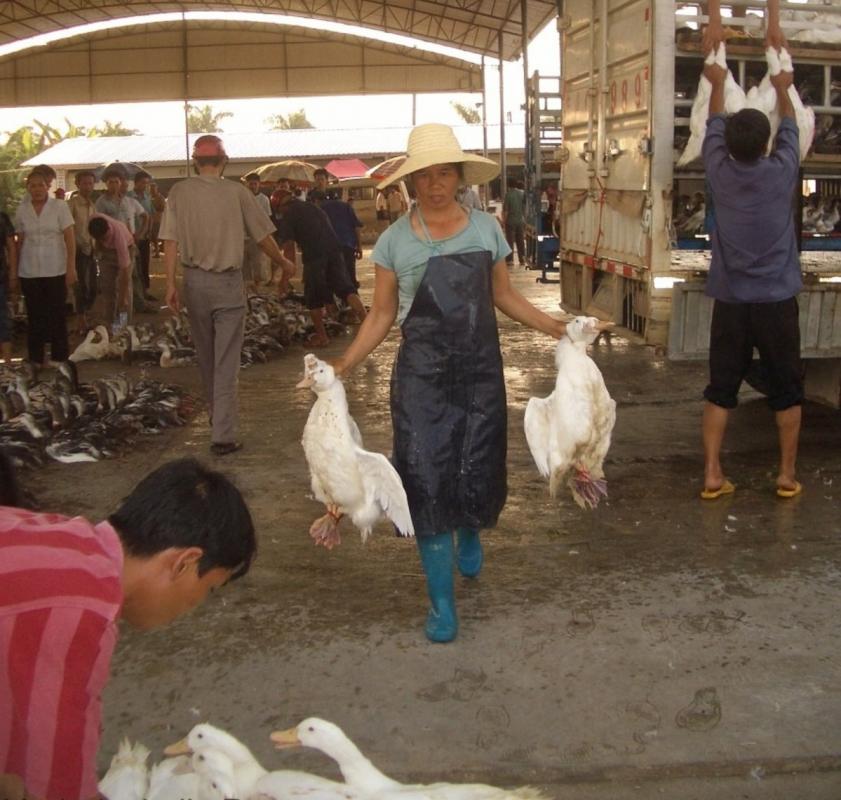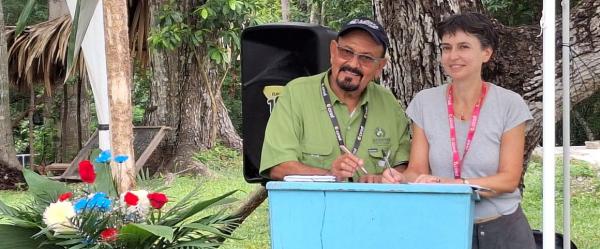Science at work 16 December 2025
- Home
- Press area
- Press releases
- health monitoring system emerging diseases MOOD
Dealing with emerging diseases: rethinking how we monitor global health

Wuhan's live animal market is believed to have served as an incubator and accelerated the spread of the COVID-19 virus, according to scientists © M-I. Peyre, CIRAD
What are the risks of a new pathogen in Europe? What are the risks of it spreading? Where is it most likely to spread? These are the preliminary questions that will be addressed by the MOOD project. The project aims to improve epidemic intelligence tools and services, with a strong focus today on COVID-19.
Coordinated by CIRAD as part of the EU H2020 programme, MOOD has a budget of 14 million euros and brings together 25 partners from 12 countries including research institutions, public health agencies and veterinary services. When the programme concludes at the end of 2023, its participants will have developed new monitoring tools to supplement those already in existence. These new tools will be shared with all countries.
Faced with the COVID-19 emergency, the MOOD team quickly rolled out specific measures, notably around the modelling of its transmission, early detection of cases and their development. "With the outbreak of COVID-19, we are working twice as hard, while maintaining the trajectory of the initial programme," stresses Renaud Lancelot, a CIRAD researcher and MOOD’s scientific coordinator.
"The exchanges are intense. They are taking place via videoconference until the MOOD launch meeting can be held in Stockholm, as was planned prior to the restrictions relating to COVID-19," says project leader and CIRAD researcher Elena Arsevska.
The Swedish capital was chosen for the official launch of the project because it is home to the headquarters of the European Centre for Disease Control (ECDC). The ECDC is one of MOOD's key partners, along with the WHO (the World Health Organization), FAO (the Food and Agriculture Organization of the United Nations) and OIE (the World Organization for Animal Health).
Unifying and improving health monitoring in Europe and around the world
The MOOD project will come in four stages:
- Five case studies on epidemic intelligence systems in European countries with different socioeconomic statuses, geography, climate, and surveillance methods have already begun. This is focused on Spain, Finland, France, Italy and Serbia;
- Together with the epidemic intelligence stakeholders in these countries, work will then be carried out to characterize their systems and then jointly assess their needs in terms of epidemic intelligence tools and services;
- Tools and services will be developed and made available to the ECDC and the public health agencies involved in the project and disseminated in Europe and beyond, particularly in the global South;
- Finally, these new co-constructed tools and services will be shared at a reasonable cost and, if possible, be open source.
For four years, research institutions, foundations and government public health and veterinary organizations will work together to unify and improve epidemic intelligence tools and services.
Epidemic intelligence systems, or how to assess the risk of emerging pathogens With climate change, animal and human mobility, growing populations and urbanization, there is now an increased risk of the emergence and accelerated global spread of new pathogens. It is crucial that the emergence of a pathogen can be rapidly detected and assessed for the risk it poses to public health: days and sometimes hours can make all the difference. In response to this, public health agencies are developing epidemic intelligence systems that rely on two types of information: "official" sources reported by public health services, and so-called "unofficial" sources, which relay information found in the media, scientific articles or laboratory data. In recent years, systems based on unofficial sources have proved particularly effective in detecting the emergence of new diseases by exploiting, for example, data from internet forums, online press articles and even social media. However, this means processing huge amounts of data. How can we spot the early warning signs among all this information? How can they be prioritized? How can we interpret them? How can we assess the risk of a new pathogen spreading? It is hoped MOOD will help answer these questions by providing existing monitoring platforms with methodological and practical support in response to their needs. Beyond health data, other types of data will also be incorporated to better assess the risk of a pathogen spreading. This could include information on climate, migration, land use and even deforestation |
* Partners involved in MOOD :
France: ANSES, CIRAD, INRAE, INSERM, University of Montpellier-LIRMM, GERDAL
Germany: Mundialis GmbH & Co KG
Belgium: Institute of Tropical Medicine, Free University of Brussels, Catholic University of Leuven, Avia-GIS
Spain: Instituto de Salud Carlos III
Italy: Fondazione Edmund Mach/Fondazione Bruno Kessler, Istituto Superiore di Sanità
Finland: Finnish Institute for Health and Welfare
Netherlands: Stichting OpenGeoHub
Portugal: Instituto de Engenharia de Sistemas e Computadores - Investigação e Desenvolvimento
United Kingdom: University of Oxford, Environmental Research Group Oxford Limited, University of Southampton
Serbia: Institute of Public Health of Serbia
Switzerland: ETH Zürich, SIB Institut Suisse de Bioinformatique
United States of America: International Society for Infectious Diseases
This project has received funding from the European Union Horizon 2020 research and innovation programme under grant agreement No 874850 - MOOD.




























